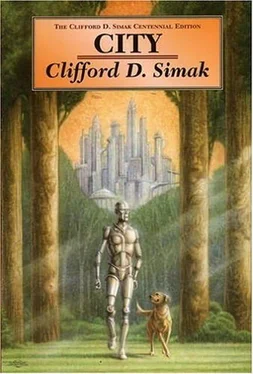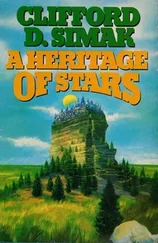Clifford Simak - City
Здесь есть возможность читать онлайн «Clifford Simak - City» весь текст электронной книги совершенно бесплатно (целиком полную версию без сокращений). В некоторых случаях можно слушать аудио, скачать через торрент в формате fb2 и присутствует краткое содержание. Жанр: Фантастика и фэнтези, на английском языке. Описание произведения, (предисловие) а так же отзывы посетителей доступны на портале библиотеки ЛибКат.
- Название:City
- Автор:
- Жанр:
- Год:неизвестен
- ISBN:нет данных
- Рейтинг книги:3 / 5. Голосов: 1
-
Избранное:Добавить в избранное
- Отзывы:
-
Ваша оценка:
- 60
- 1
- 2
- 3
- 4
- 5
City: краткое содержание, описание и аннотация
Предлагаем к чтению аннотацию, описание, краткое содержание или предисловие (зависит от того, что написал сам автор книги «City»). Если вы не нашли необходимую информацию о книге — напишите в комментариях, мы постараемся отыскать её.
City — читать онлайн бесплатно полную книгу (весь текст) целиком
Ниже представлен текст книги, разбитый по страницам. Система сохранения места последней прочитанной страницы, позволяет с удобством читать онлайн бесплатно книгу «City», без необходимости каждый раз заново искать на чём Вы остановились. Поставьте закладку, и сможете в любой момент перейти на страницу, на которой закончили чтение.
Интервал:
Закладка:
For a webster was a man. And the Dogs had not been first.
Homer lay before the fire, a limp pile of fur and bone and muscle, with his paws stretched out in front of him and his head resting on his paws. Through half-closed eyes he saw the fire and shadow, felt the heat of the blazing logs reach out and fluff his fur.
But inside his brain he saw the sand and the squatting robot and the hills with the years upon them.
Andrew had squatted in the sand and talked, with the autumn sun shining on his shoulders... had talked of men and dogs and ants. Of a thing that had happened when Nathaniel was alive, and that was a time long gone, for Nathaniel was the first Dog.
There had been a man named Joe... a mutant-man, a more-than-man... who had wondered about ants twelve thousand years ago. Wondered why they had progressed so far and then no farther, why they had reached the dead end of destiny.
Hunger, perhaps, Joe had reasoned... the ever-pressing need to garner food so that they might live. Hibernation, perhaps, the stagnation of the winter sleep, the broken memory chain, the starting over once again, each year a genesis for ants.
So, Andrew said, his bald pate gleaming in the sun. Joe had picked one hill, had set himself up as a god to change the destiny of ants. He had fed them, so that they need not strive with hunger. He had enclosed their hill in a dome of glassite and had heated it so they need not hibernate.
And the thing had worked. The ants advanced. They fashioned carts and they smelted ore. This much one could know, for the carts were on the surface and acrid smelting smoke came from the chimneys that thrust up from the hill. What other things they did, what other things they learned, deep down in their tunnels, there was no way of knowing.
Joe was crazy, Andrew said. Crazy... and yet, maybe not so crazy either.
For one day he broke the dome of glassite and tore the hill asunder with his foot, then turned and walked away, not caring any more what happened to the ants.
But the ants had cared.
The hand that broke the dome, the foot that ripped the hill had put the ants on the road to greatness. It had made them fight... fight to keep the things they had, fight to keep the bottleneck of destiny from closing once again.
A kick in the pants, said Andrew. A kick in the pants for ants. A kick in the right direction.
Twelve thousand years ago a broken, trampled hill. Today a mighty building that grew with each passing year. A building that had covered a township in one short century, that would cover a hundred townships in the next. A building that would push out and take the land. Land that belonged, not to ants, but animals.
A building... and that was not quite right, although it had been called the Building from the very start. For a building was a shelter, a place to hide from storm and cold. The ants would have no need of that, for they had their tunnels and their hills.
Why would an ant build a place that sprawled across a township in a hundred years and yet that kept on growing? What possible use could an ant have for a place like that?
Homer nuzzled his chin deep into his paws, growled inside his throat.
There was no way of knowing. For first you had to know how an ant would think. You would have to know her ambition and her goal. You would have to probe her knowledge.
Twelve thousand years of knowledge. Twelve thousand years from a starting point that itself was unknowable.
But one had to know. There must be a way to know.
For, year after year, the Building would push out. A mile across, and then six miles and after that a hundred. A hundred miles and then another hundred and after that the world.
Retreat, thought Homer. Yes, we could retreat. We could migrate to those other worlds, the worlds that follow us in the stream of time, the worlds that tread on one another's heels. We could give the Earth to ants and there still would be space for us.
But this is home. This is where the Dogs arose. This is where we taught the animals to talk and think and act together. This is the place where we created the Brotherhood of Beasts.
For it does not matter who came first... the webster or the dog. This place is home. Our home as well as webster's borne. Our home as well as ants.
And we must stop the ants.
There must be a way to stop them. A way to talk to them, find out what they want. A way to reason with them. Some basis for negotiation. Some agreement to be reached.
Homer lay motionless on the hearth and listened to the whisperings that ran through the house, the soft, far-off padding of robots on their rounds of duties, the muted talk of Dogs in a room upstairs, the crackling of the flames as they ate along the log.
A good life, said Homer, muttering to himself. A good life and we thought we were the ones who made it. Although Andrew says it wasn't us. Andrew says we have not added one iota to the mechanical skill and mechanical logic that was our heritage... and that we have lost a lot. He spoke of chemistry and be tried to explain, but I couldn't understand. The study of elements, he said, and things like molecules and atoms. And electronics... although he said we did certain things without the benefit of electronics more wonderfully than man could have done with all his knowledge. You might study electronics for a million years, he said, and not reach those other worlds, not even know they're there... and we did it, we did a thing a webster could not do.
Because we think differently than a webster does. No, it's man, not webster.
And our robots. Our robots are no better than the ones that were left to us by man. A minor modification here and there... an obvious modification, but no real improvement.
Who ever would have dreamed there could be a better robot?
A better ear of corn, yes. Or a better walnut tree. Or a wild rice that would grow a fuller head. A better way to make the yeast that substitutes for meat.
But a better robot... why, a robot does everything we might wish that it could do. Why should it be better?
And yet... the robots receive a call and go off to work on the Building, to build a thing that will push us off the Earth.
We do not understand. Of course, we cannot understand. If we knew our robots better, we might understand. Understanding, we might fix it so that the robots would not receive the call, or, receiving it, would pay it no attention.
And that, of course, would be the answer. If the robots did not work, there would be no building. For the ants, without the aid of robots, could not go on with their building.
A flea ran along Homer's scalp and he twitched his ear.
Although Andrew might be wrong, he told himself. We have our legend of the rise of the Brotherhood of Beasts and the wild robots have their legend of the fall of man. At this date, who is there to tell which of the two is right?
But Andrew's story does tie in. There were Dogs and there were robots and when man fell they went their separate ways... although we kept some of the robots to serve as hands for us. Some robots stayed with us, but no dogs stayed with the robots.
A late autumn fly buzzed out of a corner, bewildered in the firelight. It buzzed around Homer's head and settled on his nose. Homer glared at it and it lifted its legs and insolently brushed its wings. Homer dabbed at it with a paw and it flew away.
A knock came at the door.
Homer lifted his head and blinked at the knocking sound.
"Come in," he finally said.
It was the robot, Hezekiah.
"They caught Archie," Hezekiah said.
"Archie?"
"Archie, the raccoon."
"Oh, yes," said Homer. "He was the one that ran away."
"They have him out here now," said Hezekiah. "Do you want to see him?"
"Send them in," said Homer.
Читать дальшеИнтервал:
Закладка:
Похожие книги на «City»
Представляем Вашему вниманию похожие книги на «City» списком для выбора. Мы отобрали схожую по названию и смыслу литературу в надежде предоставить читателям больше вариантов отыскать новые, интересные, ещё непрочитанные произведения.
Обсуждение, отзывы о книге «City» и просто собственные мнения читателей. Оставьте ваши комментарии, напишите, что Вы думаете о произведении, его смысле или главных героях. Укажите что конкретно понравилось, а что нет, и почему Вы так считаете.











